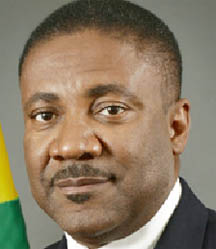(Jamaica Gleaner) – Marijuana advocates in Jamaica are on a high after Leader of Government Business in the House of Representatives Phillip Paulwell signalled to stakeholders that the use of marijuana in specific quantities is on the parliamentary agenda for decriminalisation in the upcoming legislative year.
However, in casting aside any notion of an impending legalisation of the weed, Paulwell, also the minister of science, technology, energy and mining, told The Gleaner he met last week with the Cannabis Com-mercial and Medicinal Research Taskforce (CCMRT) and conveyed his expectations of a clearer day for the ganja stakeholders.
“I met with the group last week and I indicated to them that as House leader, it is my view that the House, having adopted the motion for the decriminalisation of small amounts of marijuana, I believe that it will be enacted sometime this year,” Paulwell told The Gleaner.
Added Paulwell: “It is my view that decriminalisation of the weed will become a reality this (calendar) year, arising from the parliamentary debate and the support by the majority of the members, I believe it will be approved this year.”

The legislative year starts on April 1 and ends March 31, 2015.
But as it relates to decri-minalisation, Paulwell’s comment appeared to run counter to that of his Cabinet colleague, Foreign Affairs and Foreign Trade Minister AJ Nicholson.
The foreign minister expressed reservation over whether larger nations such as the United States are prepared to countenance legalisation/decriminalisation from smaller states such as Jamaica.
Nicholson told The Gleaner recently that the attitude of larger western nations on decriminalisation remains foggy at best. “There is no consideration at this time about changing the treaties, but there are still some concerns about how some western countries would view our move towards decriminalise, depenalise or anything like that,” he said recently.
But in relation to the more significant matter of legalisation, like Nicholson, Paulwell stressed that legalising the weed was definitely out of the question at this time. “There is no question about legalising it, but the conventions don’t prevent you from using it for medicinal or scientific purposes,” stressed Nicholson.
Paulwell, however, contended that it is within Jamaica’s supreme rights to decriminalise marijuana.
“We are not speaking about legalisation, we are speaking about decriminalisation and I think it is in our remit and within our sovereignty, based on what is happening in the United States to do so in relation to decriminalisation …; legalisation is another matter,” he stressed.
Paulwell was supported by member of the CCMRT, Delano Seiveright, who said this position represents a major game change in ongoing discourse on ganja law reform. “We have seen where many places north and south of Jamaica have been relaxing their laws as they clearly see the tremendous advantages,” he said.
Seiveright suggested that the walls of hypocrisy are falling in the United States itself, which is now at the forefront on reform, as it seems the Obama administration is steadily taking pragmatic and forward-thinking positions.
“Jamaica of all places should move to make changes sooner rather than later,” said Seiveright. “The people stand to gain from multiple standpoints, especially from the human-rights, cultural, medicinal research, tourism, taxation, agricultural and broad economic angles.
Paulwell also told members of the CCMRT that Jamaica cannot be allowed to be left behind on the issue. He reiterated the multiple economic, social and cultural benefits that the country stands to gain as soon as the laws are adjusted.
The group comprises the Ganja Law Reform Coali-tion, the National Alliance for the Legalisation of Ganja and several members of civil society. Principal of the University of the West Indies, Mona campus, Archibald McDonald, chairs the group.




